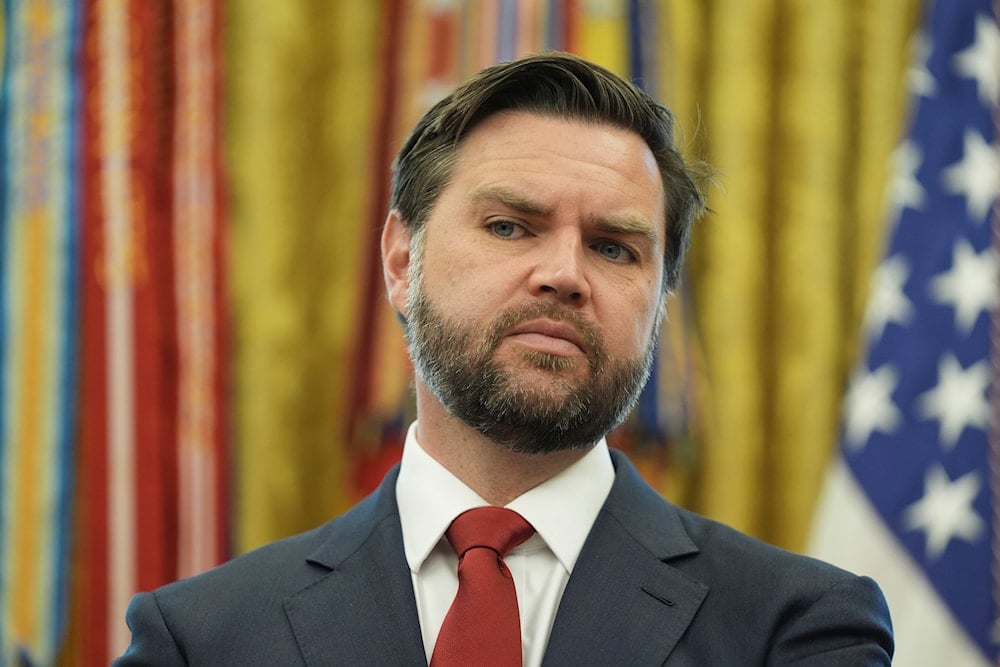US won't meddle in India-Pakistan conflict: JD Vance
US Vice President JD Vance says the India-Pakistan conflict is "none of our business," aligning with Trump's America First stance as tensions escalate after the Pahalgam attack.
-

Vice President JD Vance listens as President Donald Trump speaks with reporters after announcing a trade deal with the United Kingdom in the Oval Office of the White House, on May 8, 2025, in Washington. (AP)
JD Vance stated that the US would not get involved in the India-Pakistan conflict, emphasizing that the tensions between the two nuclear-armed nations were "fundamentally none of our business."
During an interview with Fox News, the US vice-president stated that while the US would work to de-escalate the conflict, it could not compel either side to "lay down their arms."
“What we can do is try to encourage these folks to de-escalate a little bit, but we’re not going to get involved in the middle of a war that’s fundamentally none of our business and has nothing to do with America’s ability to control it,” Vance told Fox News.
He added that since the US could not force either side to lay down their arms, it would "continue to pursue this thing through diplomatic channels" without reaching a definitive resolution.
“Our hope and our expectation is that this is not going to spiral into a broader regional war or, God forbid, a nuclear conflict,” Vance said, adding that he does not think a nuclear war is something that will transpire.
The remarks reflect Donald Trump’s "America First" foreign policy of withdrawing from America’s traditional role as a global mediator. Both Trump and Vance have made clear that Washington is ready to walk away from Ukraine ceasefire efforts if the warring sides refuse to engage in direct talks.
While Vance signaled the US's intent to reduce its role as an international mediator, Secretary of State Marco Rubio engaged with leaders from both nations, urging "immediate de-escalation," even as the foreign ministers of Iran and Saudi Arabia arrived in Delhi on Thursday to address the ongoing crisis.
Vance, who has taken on a key foreign policy role in the new Trump administration, visited India last month and stated that while India could retaliate against "terrorists" in Pakistan, the United States wanted to prevent such actions from sparking a larger regional conflict.
He expressed hope that India would respond to the recent attack in Kashmir without escalating tensions across the region while urging Pakistan, if bearing any responsibility, to cooperate with India in tracking down and neutralizing terrorist groups operating within its borders.
The US vice president's comments come at the height of the tensions between Pakistan and India, after India launched attacks on Pakistan following the Pahalgam attack.
India-Pakistan tensions reach new heights
Pakistan's Prime Minister Shehbaz Sharif warned in a televised national address that India "will have to suffer the consequences" for its overnight missile strikes, which killed at least 31 civilians, as tensions escalated between the nuclear-armed neighbors.
US President Donald Trump reacted by calling the situation "so terrible," adding, "I get along with both. I know both very well, and I want to see them work it out. I want to see them stop, and hopefully, they can stop now. If I can do anything to help, I will be there."
Meanwhile, Turkey’s President Recep Tayyip Erdogan also weighed in after speaking with Sharif via a phone call. A Turkish presidential readout said Erdogan expressed “solidarity” with Islamabad and supported Pakistan’s “calm and restrained policies.” He also endorsed Pakistan’s call for an investigation into the deadly attack in Indian-administered Kashmir that ignited the current crisis.
Iranian Foreign Minister Abbas Araghchi led a diplomatic delegation to New Delhi on Wednesday evening for talks with Indian officials, where he will co-chair a joint economic commission meeting with Indian counterpart Subrahmanyam Jaishankar to review progress on bilateral agreements, following his recent visit to Pakistan.
After tensions between India and Pakistan escalated in recent weeks, India launched a military operation dubbed "Sindoor", which included strikes on several sites inside Pakistan.
Islamabad, in turn, vowed to respond and announced it had downed five Indian aircraft before they entered its airspace. It added that the Indian attack resulted in the killing of 26 civilians and the injury of 46 others.

 4 Min Read
4 Min Read








